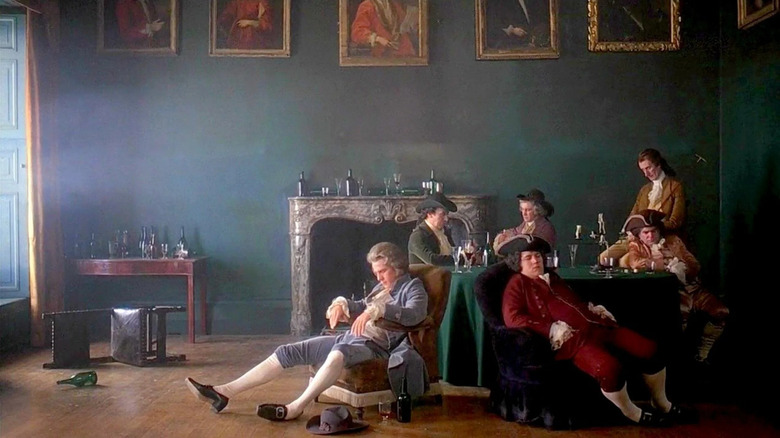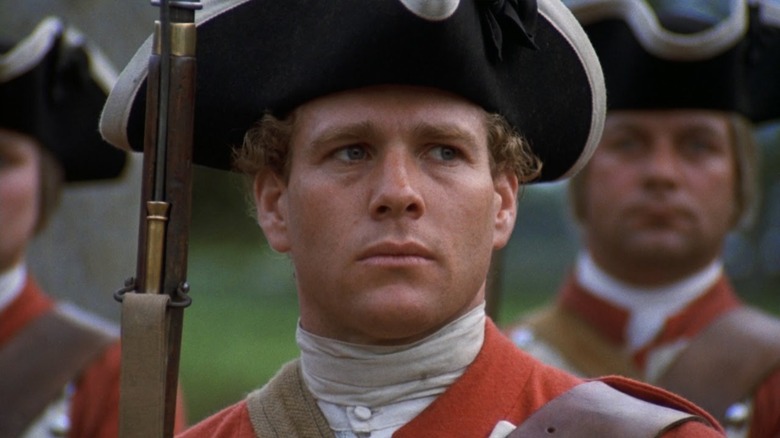Adding A Voiceover To Barry Lyndon Solved A 'Cumbersome' Problem For Stanley Kubrick
Stanley Kubrick's epic period drama "Barry Lyndon" was actually an adaptation of an 1844 novel — and the movie took some creative liberties. The source material for the film was "The Luck of Barry Lyndon" by William Makepeace Thackeray. The 1976 Oscar-winning film is lauded for its historical accuracy and loyal adaptation of the text, but it strays from the narrative voice of the novel.
Thackeray's book is written in first-person, which might have encouraged Kubrick to explore the use of voiceover. However, the narration in "Barry Lyndon" is not used to investigate the inner feelings of the main character. Instead, Kubrick employs an omniscient narrator to move the story along.
"Barry Lyndon" is set in England during the late 1700s. Barry is the impulsive and opportunistic antihero who finds himself in a life-long string of misadventures, from his capture in Prussia to his seduction of a wealthy Countess. Barry takes her last name, Lyndon, along with all the money he can get his hands on.
Kubrick felt strongly that the subjective point-of-view in the novel would not translate the same way onscreen. "In a film you have objective reality in front of you all of the time, so the effect of Thackeray's first-person story-teller could not be repeated on the screen," he explained to critic Michael Ciment (via Cinephilia & Beyond). "It might have worked as comedy by the juxtaposition of Barry's version of the truth with the reality on the screen, but I don't think that Barry Lyndon should have been done as a comedy."
Even though the narrator did not reflect Barry's point of view, it could still be used to juxtapose his behavior as "an ironic counterpoint" in smaller moments, like his meeting with a German peasant girl.
Kubrick used voice-over for exposition
Despite abandoning the first-person perspective, Kubrick still found that voice-over would be a valuable tool in the making of "Barry Lyndon." Since the story was so dense, the director needed an "economic" way to convey information that was needed to build other, more climactic, plot-points. Kubrick found that the best way to do this was through third-person narration. As he told Michael Ciment:
"A voice-over spares you the cumbersome business of telling the necessary facts of the story through expositional dialogue scenes which can become very tiresome and frequently unconvincing. ... Voice-over, on the other hand, is a perfectly legitimate and economical way of conveying story information which does not need dramatic weight and which would otherwise be too bulky to dramatize."
Kubrick was not worried about spoiling the drama with a voice-over. In fact, he found that anticipating the onscreen action or the audience's reaction didn't dissolve suspense — it created it.
"I think the commentary creates the same dramatic effect as, for example, the knowledge that the Titanic is doomed while you watch the carefree scenes of preparation and departure. These early scenes would be inexplicably dull if you didn't know about the ship's appointment with the iceberg. Being told in advance of the impending disaster gives away surprise but creates suspense."
Kubrick was a visual storyteller with a distinct cinematic style, but he knew when to employ voice-over to do the job. Even though the narration was omniscient, Kubrick still managed to play with its reliability — similarly to how Thackeray had made Barry an unreliable narrator in his book. In this way, Kubrick does undeniable justice to his source material and brings it to life onscreen.

